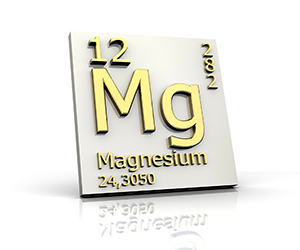by Paula Owens —

Magnesium is found in all bodily tissues but mainly in the bones, muscles and brain, and is considered the anti-stress and relaxation mineral.
Magnesium is a vital mineral involved in more than 300 enzymatic reactions in the body. It is important for heart and brain health, hormone production, hypertension, stabilizing blood sugar and the digestion of protein, carbs and fats, as well as many other functions. Magnesium is found in all bodily tissues but mainly in the bones, muscles and brain, and is considered the anti-stress and relaxation mineral.
Magnesium takes part in the transmission of hormones, such as insulin, thyroid, estrogen, testosterone, DHEA and neurotransmitters, such as dopamine, serotonin, catecholamines, GABA, and minerals and electrolytes.
An estimated 80 percent of the population is deficient in magnesium — especially the elderly. Diabetics and those who use alcohol, caffeine, blood pressure drugs, diuretics, antibiotics, oral contraceptives and sleep medications are highly susceptible to magnesium deficiency.
Depletion of magnesium is very common due to diets high in carbohydrates, sugar, soda and processed, packaged foods. Individuals who sweat excessively, drink fluoridated water, use fluoridated toothpaste, take medications, experience high-stress lifestyles and have depleted adrenal glands can suffer from magnesium insufficiency. On top of that, food levels of magnesium have declined drastically in recent years due to mineral-depleted soils, genetically modified organisms (GMOs) and the consumption of conventionally grown foods.
Many individuals often believe they are deficient in calcium, when in reality they are actually magnesium deficient. Magnesium is a synergist for calcium and vitamin D absorption and, no matter how much vitamin D one takes, it cannot work properly if one is deficient in magnesium. Without adequate magnesium, excess calcium collects in the soft tissues instead of bone, causing calcium deposits, in addition to an increased risk of osteoporosis, kidney stone and arthritis. Excessive amounts of calcium without the counterbalance of magnesium can lead to a heart attack and sudden death. Magnesium is critical for heart health.
Magnesium deficiency is responsible for many chronic health problems and diseases, including osteoporosis and metabolic syndrome, a combination of different metabolic disorders that increase the risk of developing cardiovascular diseases and diabetes. In two separate studies published in the American Journal of Clinical Nutrition, magnesium deficiency was found to be associated with abnormal bone calcification. Both studies conveyed that the higher the intake of magnesium, the greater the level of bone mineral density.
Insufficient levels of magnesium increase inflammation and exacerbate age-related diseases such as cardiovascular disease, diabetes and hypertension. Low magnesium levels can contribute to a heavy metal deposit in the brain that may be responsible for Alzheimer’s, Parkinson’s and multiple sclerosis.
Common symptoms and conditions related to magnesium deficiencies — These include: abnormal heart rhythms; anxiety, hypertension, irritability and agitation; alcoholism, chocolate cravings, diabetes and insulin resistance; chronic fatigue; asthma; ADHD and ADD; irritable bowel syndrome; inflammation; fibromyalgia; tissue injury; muscle cramps, spasms and weakness; insomnia, panic attacks and psychological stress; kidney and gall stones; PMS; restless leg syndrome; persistent eye twitching; vertigo; sensitivity to noises; tension and migraine headaches; and numbness and tingling.
Magnesium is beneficial for adrenal dysfunction, depression, headaches, brain function, calming the nervous system, atherosclerosis, healthy telomeres, cell protection from toxic metals, chronic stress, type 2 diabetes, insomnia, kidney stones, arterial fibrillation, hypertension, cardiovascular function, osteoporosis, constipation, reducing risk of colon cancer, PMS, fibromyalgia, chronic fatigue, healthy aging, detoxification, GI dysfunction, muscle cramps and spasms.

Soaking in a tub with 4 to 6 cups of Epsom salts (magnesium sulfate) is also beneficial. The magnesium is absorbed through the skin and is great for relaxation before bedtime.
Testing — Routine blood testing is not an accurate or effective marker to detect magnesium levels, since less than 2 percent of magnesium is found in the blood. The majority of magnesium (99 percent) is located in the cells and the fluid around cells, in muscle and bone. Laboratory values that are within normal limits give a false sense of security about the actual magnesium status.
Food sources of magnesium — The highest source is found in chlorophyll-rich organic leafy greens. Other sources include seaweed, unsweetened cacao, nuts, seeds, parsley, cilantro, avocado and smaller levels in fish, shrimp and wild salmon.
Magnesium supplementation is an inexpensive investment to include in your supplemental arsenal. A highly absorbed, bioavailable, chelated form of magnesium is important. These include magnesium taurate, citrate, aspartate, orotate, fumerate, threonate, malate and glycinate. Magnesium oxide is a nonchelated, lower quality magnesium that is poorly absorbed.
Although the RDA recommends 300 to 400 mg/day, most individuals benefit from 400 to 1000 mg daily or up to bowel tolerance. Too much magnesium can cause loose stools, which can be alleviated by supplementing with magnesium glycinate.
A phosphorylated form of vitamin B6 taken with magnesium can be helpful since the level of B6 in the body determines how much magnesium will be absorbed into the cells.
Supplementing with magnesium is best taken between meals, after exercising or before bedtime when little or no fat is present in the gut (fat binds to magnesium and prevents absorption). Individuals with kidney or heart disease should consult with their doctor prior to supplementing with magnesium.
Soaking in a tub with 4 to 6 cups of Epsom salts (magnesium sulfate) is also beneficial. The magnesium is absorbed through the skin and is great for relaxation before bedtime.
Alternatively, magnesium chloride, a topical transdermal form of magnesium oil, is easily assimilated and metabolized by the body. Apply behind the knees or the inner arms before bedtime.
A favorite before-bedtime magnesium cocktail is 450 mg of magnesium glycinate, one teaspoon of magnesium threonate and three pumps of topical magnesium oil applied behind the knees.
Paula Owens, M.S., is a nutritionist and fitness expert with more than 25 years of experience. She is the author of The Power of Four and Fat Loss Revolution and the creator of “21 Days to a Leaner, Healthier You,” an online exercise and weight-loss program. PaulaOwens.com.
Reprinted from AzNetNews, Volume 33, Number 1, February/March 2014.





February 17, 2014
Diet, Featured, February/March 2014 issue, Food, Inflammation, Nutrition, Stress, Vitamins, Minerals and Supplements